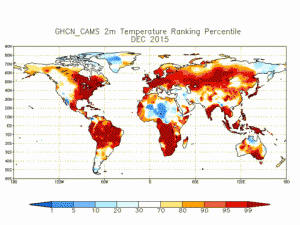Emerging threatRecent summer temperatures in Europe likely the warmest of the last 2 millennia
Most of Europe has experienced strong summer warming over the course of the past several decades, accompanied by severe heat waves in 2003, 2010, and 2015. New research now puts the current warmth in a 2,100-year historical context. The evidence suggests that past variability has been associated with large volcanic eruptions and changes in the amount of energy received from the sun, but that temperatures over the past thirty years lie outside the range of these natural variations, supporting the conclusion that recent warming is mainly caused by anthropogenic activity.

Rendering of the world's change in average temperature // Source: noaa.gov
Most of Europe has experienced strong summer warming over the course of the past several decades, accompanied by severe heat waves in 2003, 2010, and 2015. New research now puts the current warmth in a 2,100-year historical context using tree-ring information and historical documentary evidence to derive a new European summer temperature reconstruction.
The work was published in the journal of Environmental Research Letters by a group of forty-five scientists from thirteen countries.
IOP notes that warm summers were experienced during Roman times, up to the third century, followed by generally cooler conditions from the fourth to the seventh centuries. A generally warm medieval period was followed by a mostly cold Little Ice Age from the fourteenth to the nineteenth centuries. The pronounced warming early in the twentieth century and in recent decades is well captured by the tree-ring data and historical evidence on which the new reconstruction is based.
The evidence suggests that past natural changes in summer temperature are larger than previously thought, suggesting that climate models may underestimate the full range of future extreme events, including heat waves. This past variability has been associated with large volcanic eruptions and changes in the amount of energy received from the sun.
The new research finding that temperatures over the past thirty years lie outside the range of these natural variations supports the conclusions reached by the International Panel on Climate Change (IPCC) that recent warming is mainly caused by anthropogenic activity.
“We now have a detailed picture of how summer temperatures have changed over Europe for more than two thousand years and we can use that to test the climate models that are used to predict the impacts of future global warming,” says the coordinator of the study, Professor Jürg Luterbacher from the University of Giessen in Germany.
The interdisciplinary study involved the collaboration of researchers from Past Global Changes’ (PAGES) original European 2k Network working group, Euro-Med2k. PAGES, a core project of the International Geosphere-Biosphere Program (until 2015) and Future Earth (2015-), is funded by the U.S. and Swiss National Science Foundations and the U.S. National Oceanic and Atmospheric Administration.
— Read more in J. Luterbacher et al., “European summer temperatures since Roman times,” Environmental Research Letters 11 (29 January 2016) (DOI: 10.1088/1748-9326/11/1/024001)
